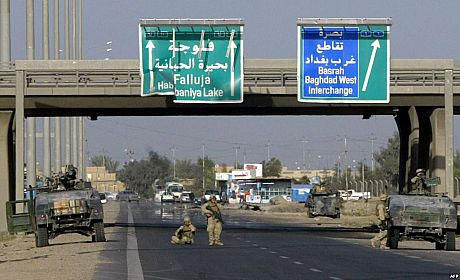Sunnis’ Confrontational Message to Noori al-Maleki

There have been reports that the city of Fallujah in the province of Al-Anbar is under the control of al-Qaeda forces now. What are the consequences of this incident for the government of Mr. Noori al-Maleki?
Al-Qaeda’s dominance over the city of Fallujah has not been done through military forces. Fallujah is a special city whose people are fighters and the American forces were not able to conquer this city. Therefore, al-Qaeda’s control over this city indicates that some of the nomads of Fallujah cooperate with al-Qaeda and have practically given the city to them. This issue shows that there is a form of dualism about the presence of al-Qaeda in Iraq.
What type of dualism?
One group is against al-Qaeda, including the governor of al-Anbar who has asked the government to intervene and the provincial council of al-Anbar and some of the nomads who succeeded in cleansing the city of Ramadi from the presence of al-Qaeda in the first day and either killed these forces or made them flee. Another group does not believe in fighting against al-Qaeda and have secret relations and cooperation with this group. These are part of the nomads and parliament representatives who have resigned. They accept al-Qaeda’s presence and have a coalition with them.
You stated that some of the nomads have given the city to al-Qaeda due to their relations with them. Is this measure taken by the nomads in line with fighting against the government of Noori al-Maleki with regard to the measures which the government has taken against the terrorist groups in al-Anbar?
Yes. The nomads have taken this measure to confront Mr. Maleki. But in Ramadi, the nomads have numerous considerations about Maleki’s policies and differentiate between the independence of the city and non-domination of al-Qaeda and their differences of opinion with Mr. Maleki. But it seems that in Fallujah the political growth has not reached the level that they could differentiate between their differences with al-Maleki and giving the control of the city to al-Qaeda forces.
Do you believe that the presence of al-Qaeda is only aimed at sending a message to Noori al-Maleki and that perhaps they do not control this city in practice?
I believe that the people have more power than al-Qaeda and if they were against their presence, they would easily force them out of Fallujah. Therefore, I believe that there is some type of cooperation.
Is there the possibility of forcing these forces out of the city through government forces?
I assume that the government’s priority is to destroy al-Qaeda bases in western Iraq in this country’s triangular border with Syria, Jordan and Saudi Arabia. This region has been transformed into a place for training, organization, car bombs and their distribution in the cities of Iraq. Thus, destroying the bases will practically transform Fallujah into an island. Fallujah is important so long as the al-Qaeda forces are able to pass through the western regions of the al-Anbar province, which is their main station. If the government succeeds in cleansing this region, I believe that the Daesh group in Fallujah will automatically be destroyed.
Does the presence of al-Qaeda forces in al-Anbar indicate their transfer from Syria to Iraq? Do they seek to expand their activities under the name of the Islamic State of Iraq and the Levant?
First, the phenomenon of al-Qaeda in Iraq is not separate from Syria and Lebanon. Second, they have so many forces in Syria that their forces have actually poured into Iraq and Lebanon. These forces also change their places. Any time the pressure increases in Iraq, they go to Syria and any time they feel pressured in Syria, they go to Iraq. Under the name of the Islamic State of Iraq and the Levant, they have practically defined their geographical limits beyond Iraq.
Considering the clashes between the terrorist forces and the military, how would you assess the Maleki government’s performance?
I suppose that the fact that Mr. Maleki did not accept the people’s demands led to the start of the protests, and this created a sort of dissatisfaction in Iraq’s Sunni provinces. So these provinces became a suitable place for recruiting al-Qaeda forces, because it is more easily possible to recruit forces from among the dissatisfied. Perhaps Maleki’s behavior toward the Sunni provinces was not right. However, Maleki’s recent measures in cleansing the al-Anbar province and then the Nineveh province and Mosul were the right measures to take because if he had not done so, the process of explosions, killings, and terrorist operations would have been repeated in Iraq and this would destroy the reputation of the new political system in Iraq and this would certainly deal a big blow to Mr. Maleki.
Amidst the chaos of the operations last week, the army retreated. Why did they retreat?
The order was to calm the protests and leave the city so that the police forces could then establish security. But the government’s assumption about the power of the police forces against the al-Qaeda forces might have been incorrect. The government assumed that the police forces had this power, but with the fall of 4 police headquarters in Ramadi, the army understood that it had made a mistake and so it returned and cleansed the city with the help of the nomads in Ramadi.
What can the Iraqi government do to prevent further challenges in this region?
The destruction of al-Qaeda bases in western al-Anbar would resolve and put an end to many problems including insecurity, bombings, and other terrorist operations.

